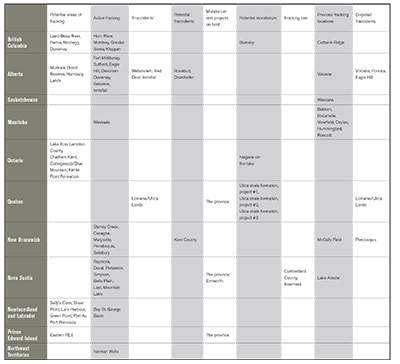
Features
Contamination
Water Issues
Frustrations with fracking
This chart sheds light on hydraulic fracturing.
August 28, 2013 By Karly O’Brien
Not too many environmental stewards are rooting for hydraulic fracturing, or fracking, as it’s known, in Canada.
Not too many environmental stewards are rooting for hydraulic fracturing, or fracking, as it’s known, in Canada. This controversial drilling process is used to extract natural gas from shale, and coal beds with horizontal and vertical drilling.
When Environics polled Canadians across the country, roughly 62 per cent said they strongly or somewhat supported a moratorium on hydraulic fracturing for natural gas until all federal environmental reviews have been completed. By region the biggest supporters of a moratorium are: British Columbia (67 per cent), the Atlantic provinces (66 per cent) and Ontario (65 per cent). The weakest support comes from Saskatchewan/Manitoba (64 per cent), Alberta (57 per cent) and Quebec (55 per cent).
Concerns arise because of the large quantity of water needed, along with thousands of chemicals that are injected into the rock bed at a very high pressure to free up the trapped gas. The chemical-filled water has the potential to seep into the cracks created during the process, and end up contaminating the ground water.
Emma Lui, the water campaigner for Council of Canadians, says that the organization opposes fracking for a number of reasons.
“We stand against it as it can initiate water contamination,” she explains. “Some other implications are the large amounts of waste water, which there are no regulations of how to properly dispose of, as well as the large amount of water used in the first place.”
Communities across the country are raising red flags because of water contamination, greenhouse gas emissions and the impacts on public health.
One woman in Rosebud, Alta., is suing Encana after her water well became contaminated with chemicals to the point where her dogs wouldn’t touch it. The lawsuit was launched last year.
Jessica Ernst is a scientist with 30 years’ experience in the oil and gas industry as a consultant. In June, she released a 93-page report on her findings on the process.
She states in her report that “obtaining data on ground water contamination caused by the oil and gas industry in Canada is nearly impossible because of confidentiality agreements (non-disclosure or gag orders). This should be made illegal.”
On the other hand, Ken Hugo, a hydrogeologist, says that oil companies have a high incentive to avoid polluting ground water with chemicals.
“They don’t want to screw up otherwise they will lose their investment, and they don’t want that,” stresses Hugo, who is also the technical director for the Alberta Water Well Drilling Association. “If you frack into a water zone then it’s more likely to go into your gas zone, than the gas will go into the water zone. Once the water is in your gas zone, then your well is kaput.”
He adds that many areas have levels of naturally occurring methane, and other chemicals. After several studies were completed, it was found that most of the contamination was caused by poor maintenance of the well bores.
Is this process as bad as everyone thinks, and how much fracking is happening in Canada? Here is a chart outlining where fracking is currently or might be occurring, and has already taken place. It also mentions where “fraccidents” (fracking + accidents) have occurred.
Please note:
- In Quebec, an American company, Lone Pine Resources, is planning to sue the Canadian government, under the provisions of NAFTA, for more than $250 million over Quebec’s moratorium on hydraulic fracturing. The province enforced a moratorium temporarily to conduct environmental research on the fracking process.
- In Prince Edward Island, no fracturing is currently happening since the government stated that no hydraulic fracturing would happen unless there were environmental assessments and public consultations first.
- In the Niagara region of Ontario, a resolution calling for a provincial moratorium on fracking was passed. No fracturing has occurred in Ontario, but companies are busy buying up land.

|
Download PDF here
page20_chart gwcfall13
Sources
1. http://nbfrackingresearch.com/
2. www.swn.com/operations/PublishingImages/nb-big.png
3. www.ernstversusencana.ca/wp-content/uploads/2010/10/Statement-of-Claim.pdf
4. http://business.financialpost.com/2012/11/07/alberta-has-huge-shale-oil-gas-resources-study/?__lsa=152d-0311
5. www.ffwdweekly.com/article/news-views/news/citizen-encana/
6. www.ernstversusencana.ca/wp-content/uploads/2012/12/2011-03-02-ERCB-unconventional-gas-report-2011-A.pdf
7. www.encana.com/communities/canada/
8.www.frackingcanada.ca/fracking-calgary/
9. www.cbc.ca/news/canada/new-brunswick/story/2013/06/21/nb-alward-first-nations-shale-gas-1002.html
10. http://canadians.org/media/water/2012/06-Feb-12-backgrounder.html#.UdMFieuG7bk
11. www.facebook.com/SaveGrosMorne
12. www.savegrosmorne.ca
13. www.mountainviewgazette.ca/article/20110913/MVG0801/309139989/0/mvg
14.www.albertatechfutures.ca/NewsRoom/MediaCoverage/PromisingDuvernayformation.aspx
15. www.cbc.ca/news/canada/north/story/2013/06/12/north-sahtu-fracking-decision-reaction.html
16. www.huffingtonpost.ca/2012/11/23/quebec-fracking-ban-lawsuit-lone-pine_n_2176990.html
Print this page